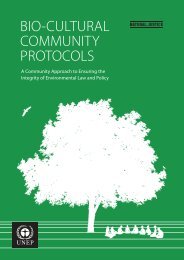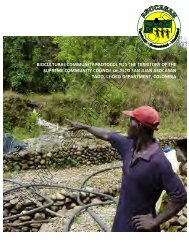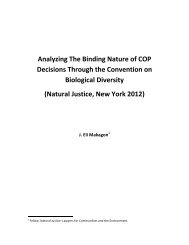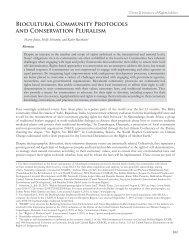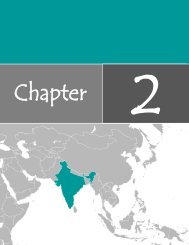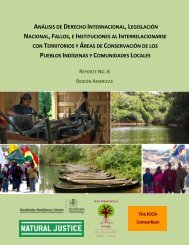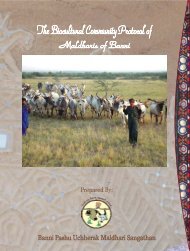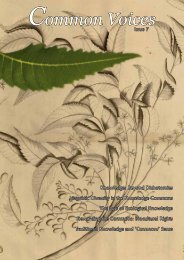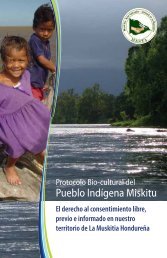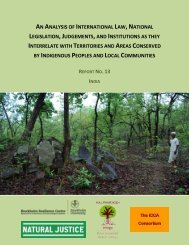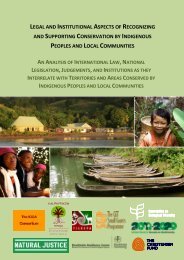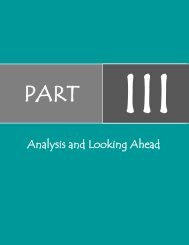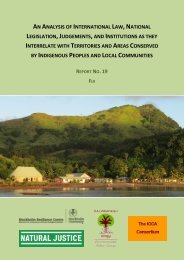Recommendations on the thematic report on ... - Natural Justice
Recommendations on the thematic report on ... - Natural Justice
Recommendations on the thematic report on ... - Natural Justice
You also want an ePaper? Increase the reach of your titles
YUMPU automatically turns print PDFs into web optimized ePapers that Google loves.
UN Working Group <strong>on</strong> <strong>the</strong> Issue of Human Rights andTransnati<strong>on</strong>al Corporati<strong>on</strong>s and O<strong>the</strong>r Business EnterprisesOffice of <strong>the</strong> High Commissi<strong>on</strong>er for Human RightsPalais des Nati<strong>on</strong>sCH-1211 Geneva 10Switzerland<str<strong>on</strong>g>Recommendati<strong>on</strong>s</str<strong>on</strong>g> <strong>on</strong> <strong>the</strong> <strong>the</strong>matic <strong>report</strong> <strong>on</strong> Indigenous Peoples andBusiness and Human Rights[Joint] Submissi<strong>on</strong> by <strong>Natural</strong> <strong>Justice</strong>: Lawyers for Communities and <strong>the</strong> Envir<strong>on</strong>ment and<strong>the</strong> Centre for Indigenous Knowledge and Organisati<strong>on</strong>al DevelopmentIntroducti<strong>on</strong>1. We welcome this opportunity to provide to <strong>the</strong> Working Group <strong>on</strong> Human Rights andTransnati<strong>on</strong>al Corporati<strong>on</strong>s and O<strong>the</strong>r Business Enterprises, submissi<strong>on</strong>s andrecommendati<strong>on</strong>s <strong>on</strong> <strong>the</strong> <strong>the</strong>matic <strong>report</strong> <strong>on</strong> indigenous peoples and business andhuman rights, in <strong>the</strong> c<strong>on</strong>text of <strong>the</strong> Guiding Principles <strong>on</strong> Business and Human Rights –Implementing <strong>the</strong> United Nati<strong>on</strong>s “Protect, Respect, and Remedy Framework”.2. This is a submissi<strong>on</strong> by <strong>Natural</strong> <strong>Justice</strong>: Lawyers for Communities and <strong>the</strong> Envir<strong>on</strong>ment,an internati<strong>on</strong>al not-for-profit organisati<strong>on</strong> based in South Africa, with regi<strong>on</strong>al officesin India, Malaysia and New York, and by <strong>the</strong> Centre for Indigenous Knowledge andOrganisati<strong>on</strong>al Development (CIKOD), a n<strong>on</strong>-profit organisati<strong>on</strong> in Ghana.3. The submissi<strong>on</strong> will address each of <strong>the</strong> questi<strong>on</strong>s posed in <strong>the</strong> c<strong>on</strong>cept note entitled“C<strong>on</strong>cept and discussi<strong>on</strong> note for c<strong>on</strong>sultati<strong>on</strong> with stakeholders <strong>on</strong> 14 February 2013”.It draws <strong>on</strong> <strong>the</strong> experiences of <strong>the</strong> partners that we work with at <strong>the</strong> local communitylevel, as well as a series of legal reviews coordinated by <strong>Natural</strong> <strong>Justice</strong> and KalpavrikshEnvir<strong>on</strong>ment Acti<strong>on</strong> Group (India) in 2012, <strong>on</strong> behalf of <strong>the</strong> Indigenous Peoples’ andCommunity C<strong>on</strong>served Territories and Areas (ICCA) C<strong>on</strong>sortium.A) Focus: What specific issues and challenges should <strong>the</strong> Working Group take into accountin drafting this <strong>report</strong>?4. There a number of issues that <strong>the</strong> Working Group must take into account when draftingits <strong>report</strong> <strong>on</strong> indigenous peoples and business and human rights, particularly in <strong>the</strong>c<strong>on</strong>text of <strong>the</strong> implementati<strong>on</strong> of <strong>the</strong> Guiding Principles <strong>on</strong> Business and Human Rights.These suggesti<strong>on</strong>s below support <strong>the</strong> discussi<strong>on</strong>s had during <strong>the</strong> Forum <strong>on</strong> Business andHuman Rights <strong>on</strong> <strong>the</strong> topic, and corresp<strong>on</strong>d with <strong>the</strong> views and experiences by <strong>Natural</strong><strong>Justice</strong> and its partner organisati<strong>on</strong>s.
5. The Guiding Principles provides very little reference to specific rights of indigenouspeoples, found in <strong>the</strong> binding ILO C<strong>on</strong>venti<strong>on</strong> No. 169 <strong>on</strong> Indigenous and TribalCommunities, and <strong>the</strong> Declarati<strong>on</strong> <strong>on</strong> <strong>the</strong> Rights of Indigenous Peoples (documented inmore detail below) in <strong>the</strong> implementati<strong>on</strong> of <strong>the</strong> Guiding Principles. This is problematic,as <strong>the</strong> Guiding Principles <strong>on</strong>ly specifically refers to minimum human rights standards as<strong>the</strong> documents expressed in <strong>the</strong> Internati<strong>on</strong>al Bill of Rights and <strong>the</strong> principlesc<strong>on</strong>cerning fundamental rights set out in <strong>the</strong> Internati<strong>on</strong>al Labour Organizati<strong>on</strong>’sDeclarati<strong>on</strong> <strong>on</strong> Fundamental Principles and Rights at Work, with a reference incommentary to instruments elaborating <strong>on</strong> <strong>the</strong> rights of indigenous peoples.6. The reality is that indigenous people have a range of human rights and envir<strong>on</strong>mentalrights across a number of different covenants, c<strong>on</strong>venti<strong>on</strong>s, declarati<strong>on</strong>s, andguidelines. However, <strong>the</strong>se rights are increasingly difficult to understand and upholdbecause of <strong>the</strong> fragmentati<strong>on</strong> of <strong>the</strong>se rights, and <strong>the</strong>ir locati<strong>on</strong> in a number of differentbinding and n<strong>on</strong>-binding legal instruments. In additi<strong>on</strong> to local socio-culturalcomplexities, domestic judicial systems in developing countries often lack sufficientlegal resources that can specifically address <strong>the</strong> often complex rights and issues ofindigenous peoples.7. Sometimes indigenous peoples’ rights are not translated into local laws forimplementati<strong>on</strong> and if <strong>the</strong>y are, States fail to support <strong>the</strong>m or to stop <strong>the</strong> acti<strong>on</strong>s ofinvesting corporati<strong>on</strong>s in violating <strong>the</strong>se rights. Alternatively, such laws protecting <strong>the</strong>rights of indigenous peoples do exist, but primacy is placed <strong>on</strong> laws that supportresource utilisati<strong>on</strong> by governments or external actors, to <strong>the</strong> detriment of existinghuman rights obligati<strong>on</strong>s towards occupants or traditi<strong>on</strong>al owners (as in <strong>the</strong> Philippines,Colombia, Fiji, and o<strong>the</strong>rs). States feel compelled to satisfy <strong>the</strong> requirements of bigbusiness at <strong>the</strong> expense of human rights and envir<strong>on</strong>mental obligati<strong>on</strong>s. Mostcomm<strong>on</strong>ly, <strong>the</strong>re can be a lack of political will or capacity of States to respect <strong>the</strong>ir ownhuman rights and envir<strong>on</strong>mental law obligati<strong>on</strong>s towards indigenous populati<strong>on</strong>s, givenwhat is perceived to be at stake including but not limited to interest and potentialincome from foreign investors, potential ec<strong>on</strong>omic benefits (ei<strong>the</strong>r c<strong>on</strong>spicuous orinc<strong>on</strong>spicuous) and development of <strong>the</strong> country (at <strong>the</strong> expense of a few).8. Big business have ei<strong>the</strong>r intenti<strong>on</strong>ally or unc<strong>on</strong>sciously exploited this fragmentati<strong>on</strong> ofindigenous peoples’ rights or lack of political will of State to enforce <strong>the</strong>ir own humanrights and envir<strong>on</strong>mental obligati<strong>on</strong>s, despite being aware of <strong>the</strong> existence of suchrights. Sometimes, corporati<strong>on</strong>s intend to respect relevant human rights andenvir<strong>on</strong>mental rights, but feel that <strong>the</strong>y are not supported by relevant domesticlegislati<strong>on</strong> or political will and do not have <strong>the</strong> means or knowledge to respect humanrights in this c<strong>on</strong>text.9. Whilst <strong>the</strong> Guiding Principles provide some guidance to relevant actors as to obligati<strong>on</strong>to protect and respect human rights and remedy human rights violati<strong>on</strong>s, <strong>the</strong>re is verylittle substantive guidance in <strong>the</strong> Guiding Principles to States or business as to how toprotect and respect <strong>the</strong> human rights of indigenous peoples in practice. Thesestakeholders need to be supported to engage in due diligence, perhaps bey<strong>on</strong>d
especting <strong>the</strong> human rights and obligati<strong>on</strong>s set out in domestic legislati<strong>on</strong>, by <strong>the</strong>Working Group.10. There appears to be a need for specific guidance as to what c<strong>on</strong>stitutes minimumstandards of engagement with indigenous peoples in <strong>the</strong> c<strong>on</strong>text of business,particularly around issues of free, prior and informed c<strong>on</strong>sent. This should be c<strong>on</strong>textspecific(for example, engaging with communities around extractive industries is likelyto be substantively different to engaging with communities around agrofuel projects,though <strong>the</strong>re may be some comm<strong>on</strong> elements or principles). And whilst <strong>the</strong>development of “minimum standards” is not desirable, given <strong>the</strong> tendency forcompanies to <strong>the</strong>n do <strong>the</strong> bare minimum, it may assist in providing some c<strong>on</strong>sistency incommunity engagement. These “minimum standards” of community engagement mustincluding participatory methodologies and must be mainstreamed. It is <strong>the</strong> lack ofmainstream knowledge or acceptance of human rights standards generally andspecifically with respect to indigenous peoples and human rights, that is a c<strong>on</strong>tributingfactor to <strong>the</strong> violati<strong>on</strong> of indigenous peoples’ rights.11. Finally, a lack of acceptance of <strong>the</strong> human rights standards, including indigenouspeoples’ rights and <strong>the</strong> guiding principles, is still evident in <strong>the</strong> acti<strong>on</strong>s and policies ofsignificant actors in business, including internati<strong>on</strong>al financial instituti<strong>on</strong>s. Theinc<strong>on</strong>sistent or c<strong>on</strong>tradictory policies of internati<strong>on</strong>al financial instituti<strong>on</strong>s such as <strong>the</strong>World Bank’s safeguards have had and c<strong>on</strong>tinue to have an impact <strong>on</strong> <strong>the</strong> rights ofindigenous peoples under internati<strong>on</strong>al law. Given this, it is imperative that <strong>the</strong>Working Group encourage all internati<strong>on</strong>al and regi<strong>on</strong>al financial instituti<strong>on</strong>s to adoptor amend existing policies in line with human rights and envir<strong>on</strong>mental law standards.B) Existing guidance and standards: What existing standards and documents should <strong>the</strong>Working Group take into account in drafting this <strong>report</strong>?12. The UN Guiding Principles <strong>on</strong> Business and Human Rights provides general guidelinesfor States to protect human rights, for business to respect human rights, and for victimsto access remedies in <strong>the</strong> event of a violati<strong>on</strong> of rights.13. However, as is becoming increasingly obvious in <strong>the</strong> requests for assistance andsubmissi<strong>on</strong>s to <strong>the</strong> Working Group, <strong>the</strong>re is a huge discord between this guidance andits operati<strong>on</strong> in reality. There is a real need to provide holistic support to business indealing with human rights, in order to educate business <strong>on</strong> <strong>the</strong> human rights principles,standards and rights that <strong>the</strong>y have an obligati<strong>on</strong> to respect under internati<strong>on</strong>al law. Itis no l<strong>on</strong>ger sufficient for business to rely <strong>on</strong> local State frameworks to protect humanrights; <strong>the</strong>re is a need for States and <strong>the</strong> internati<strong>on</strong>al community to dem<strong>on</strong>strate tobusiness <strong>the</strong> incentives to follow such human rights principles, standards and rights,given <strong>the</strong> gaps in accountability to business for breaches of human rights. There arecountless examples in existence that prove that respect for human rights is less costlythan <strong>the</strong> alternative, with respect to operati<strong>on</strong>al costs, as well as costs to reputati<strong>on</strong>.14. There are a plethora of existing standards and documents that <strong>the</strong> Working Groupshould take into account when c<strong>on</strong>sidering indigenous peoples and business and human
ights. Whilst <strong>the</strong>se will be discussed below, it is submitted that it is not <strong>on</strong>ly <strong>the</strong>existence of <strong>the</strong>se standards and documents that are useful, it is <strong>the</strong> potential forcollaborati<strong>on</strong>s with o<strong>the</strong>r fora and mechanisms that can streng<strong>the</strong>n internati<strong>on</strong>alstandards to regulate <strong>the</strong> c<strong>on</strong>duct of business with respect to human rights andindigenous peoples’ rights.Declarati<strong>on</strong> <strong>on</strong> <strong>the</strong> Rights of Indigenous Peoples15. As <strong>the</strong> Working Group has itself stated, indigenous peoples (and, arguably, localcommunities) are often <strong>the</strong> most vulnerable in society – hence <strong>the</strong> real need for aunique set of substantive and procedural standards and rights, as set out in instrumentssuch as <strong>the</strong> Internati<strong>on</strong>al Labour Organisati<strong>on</strong> C<strong>on</strong>venti<strong>on</strong> No. 169 <strong>on</strong> Indigenous andTribal Peoples and <strong>the</strong> Declarati<strong>on</strong> <strong>on</strong> <strong>the</strong> Rights of Indigenous Peoples. As recounted inour previous submissi<strong>on</strong> to <strong>the</strong> Working Group (dated 8 December 2011), and as statedby <strong>the</strong> participants of <strong>the</strong> Forum <strong>on</strong> Business and Human Rights and in many of <strong>the</strong>numerous submissi<strong>on</strong>s provided by a variety of stakeholders to <strong>the</strong> Working Group, <strong>the</strong>safeguards and rights set out in <strong>the</strong>se instruments, but particularly <strong>the</strong> United Nati<strong>on</strong>sDeclarati<strong>on</strong> <strong>on</strong> <strong>the</strong> Rights of Indigenous Peoples, are of paramount importance withrespect to indigenous peoples, business and human rights.16. The Declarati<strong>on</strong> was a product of over twenty years of negotiati<strong>on</strong> and compromise,involving a number of different stakeholders including indigenous peoples'organisati<strong>on</strong>s, States, academics, and o<strong>the</strong>r interested stakeholders. The rights within<strong>the</strong> Declarati<strong>on</strong> reflect real hardship suffered by indigenous peoples, including hardshipsuffered over generati<strong>on</strong>s at <strong>the</strong> hands of big business. Given <strong>the</strong> compromisesstakeholders made to reach <strong>the</strong>se current standards, <strong>the</strong> rights set out are regarded as"<strong>the</strong> minimum standards for <strong>the</strong> survival, dignity and well-being of <strong>the</strong> IndigenousPeoples of <strong>the</strong> world". 117. Whilst <strong>the</strong> Declarati<strong>on</strong> is not in itself binding, a majority of States around <strong>the</strong> worldvoted in support of <strong>the</strong> Declarati<strong>on</strong> (with <strong>the</strong> excepti<strong>on</strong> of New Zealand, Canada, <strong>the</strong>United States, and Australia, which all originally voted against <strong>the</strong> Declarati<strong>on</strong>, but havesubsequently overturned <strong>the</strong>ir decisi<strong>on</strong>s), illustrating worldwide acceptance of <strong>the</strong>principles, rights and duties within. In additi<strong>on</strong>, <strong>the</strong> rights reflected in <strong>the</strong> Declarati<strong>on</strong>represent pre-existing human rights generally, already recognised in a number ofhuman rights instruments (such as <strong>the</strong> Internati<strong>on</strong>al Covenant <strong>on</strong> Civil and PoliticalRights, and <strong>the</strong> Internati<strong>on</strong>al Covenant <strong>on</strong> Ec<strong>on</strong>omic, Social and Cultural Rights).Eminent jurists such as <strong>the</strong> Internati<strong>on</strong>al Law Associati<strong>on</strong>, 2 am<strong>on</strong>g o<strong>the</strong>rs, havec<strong>on</strong>cluded that <strong>the</strong>se rights are c<strong>on</strong>sidered customary internati<strong>on</strong>al law.1 Declarati<strong>on</strong> <strong>on</strong> <strong>the</strong> Rights of Indigenous Peoples, Article 43.2 Internati<strong>on</strong>al Law Associati<strong>on</strong>, 2010. The Hague C<strong>on</strong>ference <strong>on</strong> <strong>the</strong> Rights of Indigenous Peoples: InterimReport. Available at: http://www.ila-hq.org/download.cfm/docid/9E2AEDE9-BB41-42BA-9999F0359E79F62D.
The Work of United Nati<strong>on</strong>s Special Procedures18. The work of a number of special procedures within <strong>the</strong> Office of <strong>the</strong> High Commissi<strong>on</strong>for Human Rights is useful in terms of <strong>the</strong> informati<strong>on</strong> and case studies generated <strong>on</strong>indigenous issues and <strong>the</strong> impacts of business <strong>on</strong> human rights and <strong>the</strong> envir<strong>on</strong>ment.These are set out below.The Special Procedures relating to indigenous peoples19. The Working Group is already well aware of <strong>the</strong> Special Procedures relati<strong>on</strong> toIndigenous Peoples. The Special Rapporteur <strong>on</strong> <strong>the</strong> Rights of Indigenous Peoples, <strong>the</strong>Permanent Forum <strong>on</strong> Indigenous Issues and <strong>the</strong> Expert Mechanism <strong>on</strong> <strong>the</strong> Rights ofIndigenous Peoples have all produced <strong>report</strong>s with respect to business and humanrights, specifically <strong>the</strong> effects of extractive industries <strong>on</strong> indigenous peoples. It is notedthat in our original submissi<strong>on</strong>s to <strong>the</strong> Working Group (dated 8 December 2011),<strong>Natural</strong> <strong>Justice</strong> previously commented <strong>on</strong> <strong>the</strong> work of <strong>the</strong> Special Rapporteur withrespect to his work <strong>on</strong> <strong>the</strong> effects of extractive industries operating within or nearindigenous territories referring to his <strong>report</strong>s of 11 July 2011 3 and 12 July 2012. 420. The Expert Mechanism <strong>on</strong> <strong>the</strong> Rights of Indigenous Peoples has provided a number of<strong>report</strong>s of <strong>the</strong> rights of indigenous peoples <strong>on</strong> <strong>the</strong> right to participate in decisi<strong>on</strong>makingincluding: “Progress <strong>report</strong> <strong>on</strong> <strong>the</strong> study <strong>on</strong> indigenous peoples and <strong>the</strong> right toparticipate in decisi<strong>on</strong>-making”; 5 “Final <strong>report</strong> of <strong>the</strong> study <strong>on</strong> indigenous peoples and<strong>the</strong> right to participate in decisi<strong>on</strong>-making” dated 17 August 2011; 6 and finally, <strong>the</strong>“Follow-up <strong>report</strong> <strong>on</strong> indigenous peoples and <strong>the</strong> right to participate in decisi<strong>on</strong>making,with a focus <strong>on</strong> extractive industries” dated 16 August 2012. 7 In particular, <strong>the</strong>follow-up <strong>report</strong> provides a particular focus <strong>on</strong> extractive industries, with discussi<strong>on</strong>s <strong>on</strong><strong>the</strong> Guiding Principles <strong>on</strong> Business and Human Rights and guidance for actors withrespect to participati<strong>on</strong> of indigenous peoples in decisi<strong>on</strong>-making.21. The Permanent Forum <strong>on</strong> Indigenous Issues provided, <strong>on</strong> 23 February 2012, an“Analysis of <strong>the</strong> duty of <strong>the</strong> State to protect indigenous peoples affected bytransnati<strong>on</strong>al corporati<strong>on</strong>s and o<strong>the</strong>r business enterprises” to <strong>the</strong> Ec<strong>on</strong>omic and SocialCouncil. 8 The <strong>report</strong> is important, as it recognises <strong>the</strong> vital importance of <strong>the</strong> practicesand policies of States and internati<strong>on</strong>al instituti<strong>on</strong>s to <strong>the</strong> wellbeing and future ofindigenous peoples in a c<strong>on</strong>text where States are more inclined to protect <strong>the</strong> interestsof business, ra<strong>the</strong>r than <strong>the</strong> rights of <strong>the</strong>ir indigenous populati<strong>on</strong>s. The <strong>report</strong> notes <strong>the</strong>relevant internati<strong>on</strong>al laws and standards that apply and addresses <strong>the</strong> questi<strong>on</strong> as towhe<strong>the</strong>r and to what extent corporati<strong>on</strong>s should have <strong>the</strong> same rights and obligati<strong>on</strong>stoward human rights under internati<strong>on</strong>al law as States, and how <strong>the</strong> obligati<strong>on</strong>s ofStates should expand to increasingly ensure respect and protecti<strong>on</strong> of human rights by3 See A/HRC/18/35.4 See A/HRC/21/47.a5 See A/HRC/15/35.6 See A/HRC/18/42.7 See A/HRC/21/55.8 See E/C.19/2012/3.
States (<strong>the</strong>reby establishing clarity regarding corporate resp<strong>on</strong>sibility andaccountability). 9 Interestingly, it fails to note <strong>the</strong> impact of <strong>the</strong> Guiding Principles <strong>on</strong> <strong>the</strong>protecti<strong>on</strong> of human rights at a State level (and <strong>the</strong>reby respect for human rights bybusiness).The Independent Expert <strong>on</strong> <strong>the</strong> issue of human rights obligati<strong>on</strong>s relating to <strong>the</strong> enjoymentof a safe, clean and healthy envir<strong>on</strong>ment22. The work of <strong>the</strong> Independent Expert includes a mandate to study human rightsobligati<strong>on</strong>s, relating to <strong>the</strong> enjoyment of a safe, clean, healthy and sustainableenvir<strong>on</strong>ment, and to identify, promote and exchange views <strong>on</strong> best practices relating to<strong>the</strong> use of human rights obligati<strong>on</strong>s and commitments to inform, support andstreng<strong>the</strong>n envir<strong>on</strong>mental policymaking, especially in <strong>the</strong> area of envir<strong>on</strong>mentalprotecti<strong>on</strong>, recognising that protecting human rights helps to protect <strong>the</strong> envir<strong>on</strong>ment.It is generally recognised that <strong>the</strong> most impoverished in our global community areindigenous peoples and local communities, who rely <strong>on</strong> <strong>the</strong> envir<strong>on</strong>ment andecosystem services for <strong>the</strong>ir very identities, cultures, livelihoods, and wellbeing. Itfollows <strong>the</strong>n that damage to <strong>the</strong> envir<strong>on</strong>ment most acutely affects indigenous peoplesand local communities and <strong>the</strong>ir basic human rights.23. In his first <strong>report</strong> to <strong>the</strong> Human Rights Council dated December 2012, 10 <strong>the</strong> IndependentExpert notes <strong>the</strong> experiences of indigenous peoples are “at particular risk from manykinds of envir<strong>on</strong>mental damage because of <strong>the</strong>ir cultural and ec<strong>on</strong>omic dependence <strong>on</strong>envir<strong>on</strong>mental resources”. 11 Quoting <strong>the</strong> 2011 <strong>report</strong> of <strong>the</strong> Special Rapporteur <strong>on</strong> <strong>the</strong>Rights of Indigenous Peoples, <strong>the</strong> Independent Expert noted “<strong>the</strong> implementati<strong>on</strong> ofnatural resource extracti<strong>on</strong> and o<strong>the</strong>r development projects <strong>on</strong> or near indigenousterritories has become <strong>on</strong>e of <strong>the</strong> foremost c<strong>on</strong>cerns of indigenous peoples worldwide,and possibly also <strong>the</strong> most persuasive source of <strong>the</strong> challenges to <strong>the</strong> full exercise of<strong>the</strong>ir rights”. 12 The Independent Expert notes that whilst more attenti<strong>on</strong> is now beingfocused <strong>on</strong> envir<strong>on</strong>mental threats to vulnerable groups such as indigenous peoples,human rights obligati<strong>on</strong>s are still unclear, especially with respect to duties relating tospecial procedural and substantive rights. 13 Indeed, he uses <strong>the</strong> recent <strong>report</strong> of <strong>the</strong>Working Group to emphasize that almost a third of alleged corporate-related humanrights abuses alleged envir<strong>on</strong>mental harms, with a corresp<strong>on</strong>ding impact <strong>on</strong> humanrights. 14 The work of <strong>the</strong> Independent Expert in raising awareness of envir<strong>on</strong>mentallyrelatedhuman rights obligati<strong>on</strong>s with reference to business and indigenous peoples isimportant, and will c<strong>on</strong>tinue to emerge through <strong>the</strong> work of this particular Independentexpert.9 Permanent Forum <strong>on</strong> Indigenous Issues <strong>report</strong>, Paragraph 54.10 “Report of <strong>the</strong> Independent Expert <strong>on</strong> <strong>the</strong> issue of human rights obligati<strong>on</strong>s relating to <strong>the</strong> enjoyment of asafe, clean , healthy and sustainable envir<strong>on</strong>ment, John H. Knox”, Report to <strong>the</strong> Human Rights Council dated 24December 2012, A/HRC/22/43.11 Report of <strong>the</strong> Independent Expert, Paragraph 45.12 Report of <strong>the</strong> Independent Expert, Paragraph 45. See A/HRC/18/35, para. 57.13 Report of <strong>the</strong> Independent Expert, Paragraph 46.14 Report of <strong>the</strong> Independent Expert, Paragraph 49.
The Special Rapporteur <strong>on</strong> <strong>the</strong> situati<strong>on</strong> of human rights defenders24. The work of <strong>the</strong> Special Rapporteur <strong>on</strong> <strong>the</strong> situati<strong>on</strong> of human rights defenderssupports <strong>the</strong> implementati<strong>on</strong> of <strong>the</strong> 1998 Declarati<strong>on</strong> <strong>on</strong> Human Rights Defenders,including a mandate to seek, receive, examine, and resp<strong>on</strong>d to informati<strong>on</strong> <strong>on</strong> <strong>the</strong>situati<strong>on</strong> of human rights defenders and establish cooperati<strong>on</strong> and dialogue withgovernments and o<strong>the</strong>r actors <strong>on</strong> <strong>the</strong> 1998 Declarati<strong>on</strong>.25. The Special Rapporteur’s <strong>report</strong> to <strong>the</strong> Human Rights Council, dated 21 December 2011and entitled “Report of <strong>the</strong> Special Rapporteur <strong>on</strong> <strong>the</strong> situati<strong>on</strong> of human rightsdefenders, Margaret Sekaggya”, 15 particularly highlights <strong>the</strong> impacts that businessactivities have had <strong>on</strong> human rights defenders working <strong>on</strong> land and envir<strong>on</strong>mentalissues, including in <strong>the</strong> c<strong>on</strong>text of extractive industries, c<strong>on</strong>structi<strong>on</strong> and developmentprojects and <strong>the</strong> rights of indigenous peoples and minority communities. In particular,part of <strong>the</strong> Special Rapporteur’s work has been <strong>the</strong> receipt of communicati<strong>on</strong>sc<strong>on</strong>cerning alleged violati<strong>on</strong>s of <strong>the</strong> rights of human rights defenders and activistsworking <strong>on</strong> land and envir<strong>on</strong>mental issues, and sending communicati<strong>on</strong>s regarding<strong>the</strong>se violati<strong>on</strong>s. She stated in her 2011 <strong>report</strong> that “<strong>the</strong> main c<strong>on</strong>text in which <strong>the</strong>seviolati<strong>on</strong>s occurred was <strong>on</strong>going land disputes with both State and n<strong>on</strong>-State actors,including multinati<strong>on</strong>al corporati<strong>on</strong>s and private security companies”. 16 Violati<strong>on</strong>sincluded attempted killings, killings, attacks, assaults, threats including death threats,intimidati<strong>on</strong> and harassment 17 as well as raids <strong>on</strong>, or destructi<strong>on</strong> of homes, andcriminalisati<strong>on</strong>, both at <strong>the</strong> hands of State and n<strong>on</strong>-state actors, such as transnati<strong>on</strong>alcompanies, and private security guards. 18 In additi<strong>on</strong>, <strong>the</strong> Special Rapporteur also actedup<strong>on</strong> allegati<strong>on</strong>s of violati<strong>on</strong>s against human rights defenders working <strong>on</strong> land andenvir<strong>on</strong>mental issues, particularly as <strong>the</strong>y related to indigenous peoples. 19 Interestingly,some of <strong>the</strong> violated communicated to <strong>the</strong> Special Rapporteur included participati<strong>on</strong> innegotiati<strong>on</strong>s with local authorities to settle land disputes, investigati<strong>on</strong> of land grabbingand representing indigenous communities at local and nati<strong>on</strong>al levels. 2026. Given <strong>the</strong> breadth of experience <strong>the</strong> Special Rapporteur has had in dealing with <strong>the</strong>human rights violati<strong>on</strong>s of human rights defenders, particularly with respect todefenders working <strong>on</strong> land and envir<strong>on</strong>mental issues and indigenous peoples, includingdirect c<strong>on</strong>tact with affected people, <strong>the</strong> work of <strong>the</strong> Special Rapporteur, particularly her2011 <strong>report</strong>, is particularly useful.Special Rapporteur <strong>on</strong> <strong>the</strong> Right to Food27. The mandate of <strong>the</strong> Special Rapporteur <strong>on</strong> <strong>the</strong> Right to Food includes <strong>the</strong> promoti<strong>on</strong> of<strong>the</strong> full realisati<strong>on</strong> of <strong>the</strong> right to food and adopti<strong>on</strong> of measures at <strong>the</strong> nati<strong>on</strong>al,15 See A/HRC/19/55.16 Report of Special Rapporteur <strong>on</strong> <strong>the</strong> situati<strong>on</strong> of Human Rights Defenders, paragraph 66.17 Report of Special Rapporteur <strong>on</strong> <strong>the</strong> situati<strong>on</strong> of Human Rights Defenders, paragraph 68.18 Report of Special Rapporteur <strong>on</strong> <strong>the</strong> situati<strong>on</strong> of Human Rights Defenders, paragraphs 69 and 70.19 See Report of Special Rapporteur <strong>on</strong> <strong>the</strong> situati<strong>on</strong> of Human Rights Defenders, paragraphs 73-80.20 Report of Special Rapporteur <strong>on</strong> <strong>the</strong> situati<strong>on</strong> of Human Rights Defenders, paragraph 73.
egi<strong>on</strong>al and internati<strong>on</strong>al levels for <strong>the</strong> realisati<strong>on</strong> of <strong>the</strong> right, examine ways andmeans of overcoming existing and emerging obstacles to realisati<strong>on</strong> of <strong>the</strong> right and topresent recommendati<strong>on</strong>s <strong>on</strong> steps to achieving <strong>the</strong> full realisati<strong>on</strong> of <strong>the</strong> right to food.His <strong>report</strong>s to <strong>the</strong> General Assembly entitled “The Right to Food” dated 11 August 2010and 8 August 2012 are relevant to <strong>the</strong> work of <strong>the</strong> Working Group and should bec<strong>on</strong>sidered when <strong>the</strong> Working Group drafts its <strong>report</strong>.28. His 2010 <strong>report</strong> discussed access to land and security of land tenure as essential to <strong>the</strong>enjoyment of <strong>the</strong> right to food worldwide, discussing existing pressures <strong>on</strong> lands such aslarge-scale plantati<strong>on</strong>s for <strong>the</strong> producti<strong>on</strong> of food, energy or cash crops and advisingcauti<strong>on</strong> where investments imply a shift in land rights. 21 In additi<strong>on</strong>, measures adoptedwith respect to climate change mitigati<strong>on</strong> of industrialised countries or envir<strong>on</strong>mentalc<strong>on</strong>servati<strong>on</strong>, such as projects developed for <strong>the</strong> purposes of REDD (Reducing Emissi<strong>on</strong>sfrom Deforestati<strong>on</strong> and Forest Degradati<strong>on</strong>) or <strong>the</strong> creati<strong>on</strong> of wildlife reserves,nati<strong>on</strong>al parks and o<strong>the</strong>r protected areas can pose as a significant threat to forestdwellers and o<strong>the</strong>r indigenous peoples who reside, traditi<strong>on</strong>ally own, occupy or utilisesuch forest-based resources for <strong>the</strong>ir livelihoods, affecting <strong>the</strong>ir human right to food. 22The Special Rapporteur <strong>on</strong> <strong>the</strong> Right to Food notes that <strong>the</strong>re has been a rapid increasein industrial uses of land and urbanisati<strong>on</strong>, with particular examples of farmers’ landsbeing expropriated for mining projects or industrial plants, with little regard to rights toproperty or compensati<strong>on</strong>. 23 The Special Rapporteur noted <strong>the</strong> particular affects ofaccess to land and security of land tenure <strong>on</strong> indigenous peoples, allocating an entiresecti<strong>on</strong> <strong>on</strong> this topic 24 and referring to relevant provisi<strong>on</strong>s in internati<strong>on</strong>al law andjurisprudence that support <strong>the</strong> implementati<strong>on</strong> and protecti<strong>on</strong> of indigenous peoples’rights.29. In <strong>the</strong> Special Rapporteur <strong>on</strong> <strong>the</strong> Right to Food’s 2012 <strong>report</strong>, <strong>the</strong> Rapporteur focuses<strong>on</strong> <strong>the</strong> role of global marine and inland fisheries to <strong>the</strong> provisi<strong>on</strong> of security, and <strong>the</strong>decline of this source of food through unsustainable and destructive fishing practices,distorting subsidies and <strong>the</strong> effects of climate change. Current challenges causingdeclining fish stocks include overfishing, reliance <strong>on</strong> industrial fishing methods includingindustrial bottom trawling 25 and polluti<strong>on</strong> and habitat loss, such as oil spills, agriculturaland industrial run-off, polluti<strong>on</strong> from aquaculture and plastic debris, and <strong>the</strong>destructi<strong>on</strong> of mangrove forests and coral reefs. 26 The Special Rapporteur <strong>on</strong> <strong>the</strong> Rightto Food’s <strong>report</strong>s c<strong>on</strong>tain valuable informati<strong>on</strong> as to <strong>the</strong> effect of business, be it throughaccess to land and insecure land tenure issues, or polluti<strong>on</strong> and unsustainable fishingpractices <strong>on</strong> indigenous peoples that <strong>the</strong> Working Group should take into account.21 Report of <strong>the</strong> Special Rapporteur <strong>on</strong> <strong>the</strong> Right to Food, 2010, paragraph 7.22 Report of <strong>the</strong> Special Rapporteur <strong>on</strong> <strong>the</strong> Right to Food, 2010, paragraph 8.23 Report of <strong>the</strong> Special Rapporteur <strong>on</strong> <strong>the</strong> Right to Food, 2010, paragraph 9.24 Report of <strong>the</strong> Special Rapporteur <strong>on</strong> <strong>the</strong> Right to Food, 2010, paragraphs 11 - 13.25 Report of <strong>the</strong> Special Rapporteur <strong>on</strong> <strong>the</strong> Right to Food, 2012, paragraphs 13 - 14.26 Report of <strong>the</strong> Special Rapporteur <strong>on</strong> <strong>the</strong> Right to Food, 2012, paragraphs 17-19.
Existing rights, guidelines and safeguards developed under internati<strong>on</strong>al envir<strong>on</strong>mentalinstrumentsC<strong>on</strong>venti<strong>on</strong> <strong>on</strong> Biological Diversity30. Much work has been d<strong>on</strong>e to enshrine and safeguard <strong>the</strong> rights of indigenous peoplesand local communities under <strong>the</strong> auspices of <strong>the</strong> C<strong>on</strong>venti<strong>on</strong> <strong>on</strong> Biological Diversity(CBD).31. In <strong>the</strong> text of <strong>the</strong> C<strong>on</strong>venti<strong>on</strong> itself, Article 8(j) encourages <strong>the</strong> respect, preservati<strong>on</strong> andmaintenance of traditi<strong>on</strong>al knowledge relevant for <strong>the</strong> c<strong>on</strong>versati<strong>on</strong> and sustainable useof biological diversity.32. Article 10 (Sustainable Use of Comp<strong>on</strong>ents of Biological Diversity) states that Partiesshall: “(a) integrate c<strong>on</strong>siderati<strong>on</strong> of <strong>the</strong> c<strong>on</strong>servati<strong>on</strong> and sustainable use of biologicalresources into nati<strong>on</strong>al decisi<strong>on</strong>-making; (b) adopt measures relating to <strong>the</strong> use ofbiological resources to avoid or minimize adverse impacts <strong>on</strong> biological diversity; (c)protect and encourage customary use of biological resources in accordance withtraditi<strong>on</strong>al cultural practices that are compatible with c<strong>on</strong>servati<strong>on</strong> or sustainable userequirements; (d) support local populati<strong>on</strong>s to develop and implement remedial acti<strong>on</strong>in degraded areas where biological diversity has been reduced; and (e) encouragecooperati<strong>on</strong> between its governmental authorities and its private sector in developingmethods for sustainable use of biological resources.”33. There are also voluntary guidelines under <strong>the</strong> auspices of <strong>the</strong> CBD that provide detailedguidance and safeguards for engagement with indigenous peoples and localcommunities by external actors, both with respect to c<strong>on</strong>duct of cultural,envir<strong>on</strong>mental and social impact assessments and to ensure respect for cultural andintellectual heritage. Ensuring effective and meaningful community engagement andparticipati<strong>on</strong> in decisi<strong>on</strong>-making processes is likely to decrease <strong>the</strong> likelihood of humanand envir<strong>on</strong>mental rights violati<strong>on</strong>s, as well as promoting <strong>the</strong> protecti<strong>on</strong> of <strong>the</strong>envir<strong>on</strong>ment. These guidelines and safeguards include:o Akwé: K<strong>on</strong> Voluntary guidelines for <strong>the</strong> c<strong>on</strong>duct of cultural, envir<strong>on</strong>mentaland social impact assessments regarding developments proposed to takeplace <strong>on</strong>, or which are likely to impact <strong>on</strong>, sacred sites and <strong>on</strong> lands andwaters traditi<strong>on</strong>ally occupied or used by indigenous and local communities(adopted as Decisi<strong>on</strong> XI/16 in 2004 by <strong>the</strong> 7 th C<strong>on</strong>ference of <strong>the</strong> Parties to <strong>the</strong>CBD).o Tkarihwaié:ri Code of Ethical C<strong>on</strong>duct to Ensure Respect for <strong>the</strong> Cultural andIntellectual Heritage of Indigenous and Local Communities (adopted asDecisi<strong>on</strong> X/42 in 2010 by <strong>the</strong> 10 th C<strong>on</strong>ference of <strong>the</strong> Parties).o Malawi Principles <strong>on</strong> <strong>the</strong> Ecosystem Approach (adopted as Decisi<strong>on</strong> XI/11 in2004 by <strong>the</strong> 7 th C<strong>on</strong>ference of <strong>the</strong> Parties)o Addis Ababa Principles and Guidelines for <strong>the</strong> Sustainable Use of Biodiversity(adopted as Decisi<strong>on</strong> VII/12 in 2004 by <strong>the</strong> 7 th C<strong>on</strong>ference of <strong>the</strong> Parties).
o Guidelines <strong>on</strong> Biodiversity and Tourism Development (adopted as Decisi<strong>on</strong>VII/14 in 2004 by <strong>the</strong> 7 th C<strong>on</strong>ference of <strong>the</strong> Parties).o Proposals for <strong>the</strong> Applicati<strong>on</strong> of Ways and Means to Remove or MitigatePerverse Incentives (adopted as Decisi<strong>on</strong> VII/18 in 2004 by <strong>the</strong> 7 th C<strong>on</strong>ferenceof <strong>the</strong> Parties).34. In additi<strong>on</strong>, <strong>the</strong> 2011-2020 Strategic Plan and Aichi Biodiversity Targets (which areintended to be used across <strong>the</strong> UN system) are also of great relevance as overarchingguidance and targets. An indicative list of indicators is c<strong>on</strong>tained in <strong>the</strong> annex toDecisi<strong>on</strong> XI/3 (M<strong>on</strong>itoring Progress in implementati<strong>on</strong> of <strong>the</strong> Strategic Plan forBiodiversity 2011-2020 and <strong>the</strong> Aichi Biodiversity Targets). The Working Group shouldc<strong>on</strong>tribute to <strong>the</strong> achievement of <strong>the</strong> following targets in particular:o Target 3: By 2020, at <strong>the</strong> latest, incentives, including subsidies, harmful tobiodiversity are eliminated, phased out or reformed in order to minimize oravoid negative impacts, and positive incentives for <strong>the</strong> c<strong>on</strong>servati<strong>on</strong> andsustainable use of biodiversity are developed and applied, c<strong>on</strong>sistent and inharm<strong>on</strong>y with <strong>the</strong> C<strong>on</strong>venti<strong>on</strong> and o<strong>the</strong>r relevant internati<strong>on</strong>al obligati<strong>on</strong>s,taking into account nati<strong>on</strong>al socio ec<strong>on</strong>omic c<strong>on</strong>diti<strong>on</strong>s.o Target 4: By 2020, at <strong>the</strong> latest, Governments, business and stakeholders atall levels have taken steps to achieve or have implemented plans forsustainable producti<strong>on</strong> and c<strong>on</strong>sumpti<strong>on</strong> and have kept <strong>the</strong> impacts of use ofnatural resources well within safe ecological limits.o Target 14: By 2020, ecosystems that provide essential services, includingservices related to water, and c<strong>on</strong>tribute to health, livelihoods and wellbeing,are restored and safeguarded, taking into account <strong>the</strong> needs ofwomen, indigenous and local communities, and <strong>the</strong> poor and vulnerable.35. The following Decisi<strong>on</strong>s of <strong>the</strong> C<strong>on</strong>ferences of <strong>the</strong> Parties to <strong>the</strong> CBD are also of directrelevance to <strong>the</strong> mandate of <strong>the</strong> Working Group (available at: www.cbd.int/decisi<strong>on</strong>s):o Decisi<strong>on</strong> XI/7 <strong>on</strong> Business and Biodiversityo Decisi<strong>on</strong> X/21 <strong>on</strong> Business Engagemento Decisi<strong>on</strong> XI/6 <strong>on</strong> Cooperati<strong>on</strong> with Internati<strong>on</strong>al Organisati<strong>on</strong>s, O<strong>the</strong>rC<strong>on</strong>venti<strong>on</strong>s and Initiatives, Secti<strong>on</strong> E (Collaborati<strong>on</strong> <strong>on</strong> biodiversity andtourism development)o Decisi<strong>on</strong> XI/25 <strong>on</strong> Sustainable Use of Biodiversity, Annex (Revised<str<strong>on</strong>g>Recommendati<strong>on</strong>s</str<strong>on</strong>g> of <strong>the</strong> CBD Liais<strong>on</strong> Group <strong>on</strong> Bushmeat), Secti<strong>on</strong> I,paragraph 236. While this work has emerged out of efforts to protect <strong>the</strong> rights of indigenous peoplesand local communities in <strong>the</strong> c<strong>on</strong>text of <strong>the</strong> c<strong>on</strong>servati<strong>on</strong>, sustainable use, andequitable sharing of benefits of biodiversity, many of <strong>the</strong> guidelines and safeguardsunder <strong>the</strong> auspices of <strong>the</strong> CBD can be applied generally and can usefully inform <strong>the</strong>work of <strong>the</strong> Working Group.UN C<strong>on</strong>ference <strong>on</strong> Sustainable Development (Rio+20)
FAO Voluntary Guidelines <strong>on</strong> <strong>the</strong> Resp<strong>on</strong>sible Governance of Tenure of Land, Fisheries andForests in <strong>the</strong> C<strong>on</strong>text of Nati<strong>on</strong>al Food Security41. The Voluntary Guidelines were adopted in 2012 by <strong>the</strong> World Committee <strong>on</strong> FoodSecurity after a multi-stakeholder c<strong>on</strong>sultati<strong>on</strong> process and provide comprehensiveguidance to improve governance of tenure of land, fisheries and forests.42. General Principle 3.2 in particular is directed towards n<strong>on</strong>-state actors, and reads:“…business enterprises have a resp<strong>on</strong>sibility to respect human rights and legitimatetenure rights. Business enterprises should act with due diligence to avoid infringing <strong>on</strong><strong>the</strong> human rights and legitimate tenure rights of o<strong>the</strong>rs. They should includeappropriate risk management systems to prevent and address adverse impacts <strong>on</strong>human rights and legitimate tenure rights. Business enterprises should provide for andcooperate in n<strong>on</strong>-judicial mechanisms to provide remedy, including effectiveoperati<strong>on</strong>al-level grievance mechanisms, where appropriate, where <strong>the</strong>y have causedor c<strong>on</strong>tributed to adverse impacts <strong>on</strong> human rights and legitimate tenure rights.Business enterprises should identify and assess any actual or potential impacts <strong>on</strong>human rights and legitimate tenure rights in which <strong>the</strong>y may be involved. States, inaccordance with <strong>the</strong>ir internati<strong>on</strong>al obligati<strong>on</strong>s, should provide access to effectivejudicial remedies for negative impacts <strong>on</strong> human rights and legitimate tenure rights bybusiness enterprises. Where transnati<strong>on</strong>al corporati<strong>on</strong>s are involved, <strong>the</strong>ir home Stateshave roles to play in assisting both those corporati<strong>on</strong>s and host States to ensure thatbusinesses are not involved in abuse of human rights and legitimate tenure rights.States should take additi<strong>on</strong>al steps to protect against abuses of human rights andlegitimate tenure rights by business enterprises that are owned or c<strong>on</strong>trolled by <strong>the</strong>State, or that receive substantial support and service from State agencies.”Aarhus C<strong>on</strong>venti<strong>on</strong>43. The C<strong>on</strong>venti<strong>on</strong> <strong>on</strong> Access to Informati<strong>on</strong>, Public Participati<strong>on</strong> in Decisi<strong>on</strong>-making andAccess to <strong>Justice</strong> in Envir<strong>on</strong>mental Matters, also known as <strong>the</strong> Aarhus C<strong>on</strong>venti<strong>on</strong>, is anenvir<strong>on</strong>mental agreement (established through <strong>the</strong> United Nati<strong>on</strong>s Ec<strong>on</strong>omicCommissi<strong>on</strong> for Europe) that links envir<strong>on</strong>mental rights with human rights. Itssignificance to <strong>the</strong> Working Group is its focus <strong>on</strong> sustainable development through <strong>the</strong>participati<strong>on</strong> of all stakeholders and interacti<strong>on</strong>s between <strong>the</strong> public and publicauthorities. Clearly, community stakeholders, including indigenous communitystakeholders, are <strong>on</strong>ly able to sufficiently engage with external actors such asgovernments and translati<strong>on</strong>al corporati<strong>on</strong>s with sufficient access to relevantinformati<strong>on</strong>, such as informati<strong>on</strong> <strong>on</strong> licensing (explorati<strong>on</strong>, extracti<strong>on</strong>, etc.) that is likelyto affect lands traditi<strong>on</strong>ally owned or utilised by indigenous peoples.Internati<strong>on</strong>al Uni<strong>on</strong> for C<strong>on</strong>servati<strong>on</strong> of Nature44. The Internati<strong>on</strong>al Uni<strong>on</strong> for C<strong>on</strong>servati<strong>on</strong> of Nature (IUCN) is <strong>the</strong> world’s oldest andlargest uni<strong>on</strong> dedicated to nature c<strong>on</strong>servati<strong>on</strong>. Its membership is comprised of morethan 1200 organisati<strong>on</strong>s, including over 200 governmental and 900 n<strong>on</strong>-governmentalorganisati<strong>on</strong>s. It also has about 11,000 voluntary scientists and experts, grouped in six
Commissi<strong>on</strong>s in some 160 countries, and <strong>the</strong> work of <strong>the</strong> Uni<strong>on</strong> is supported by over1,000 staff in 45 offices and hundreds of partners in public, NGO and private sectorsaround <strong>the</strong> world. It is c<strong>on</strong>sidered a neutral forum for governments, NGOs, scientists,business, and Indigenous peoples and local communities to find practical soluti<strong>on</strong>s toc<strong>on</strong>servati<strong>on</strong> and development challenges, and is known for its significant influence inmultilateral envir<strong>on</strong>mental fora <strong>on</strong> biodiversity, climate change, desertificati<strong>on</strong>, andsustainable development.45. At each World C<strong>on</strong>servati<strong>on</strong> C<strong>on</strong>gress held every four years, IUCN adopts a range ofResoluti<strong>on</strong>s and <str<strong>on</strong>g>Recommendati<strong>on</strong>s</str<strong>on</strong>g>. At <strong>the</strong> Fifth C<strong>on</strong>gress held in Jeju, South Korea, in2012, <strong>the</strong> following relevant Resoluti<strong>on</strong>s and <str<strong>on</strong>g>Recommendati<strong>on</strong>s</str<strong>on</strong>g> were adopted:o Resoluti<strong>on</strong> 5.046: Streng<strong>the</strong>ning <strong>the</strong> World Heritage C<strong>on</strong>venti<strong>on</strong>o Resoluti<strong>on</strong> 5.087: Energy and c<strong>on</strong>servati<strong>on</strong>o Resoluti<strong>on</strong> 5.089: Dams and hydraulic infrastructureo Resoluti<strong>on</strong> 5.094: Respecting, recognizing and supporting IndigenousPeoples’ and Community C<strong>on</strong>served Territories and Areaso Resoluti<strong>on</strong> 5.096: Recognising <strong>the</strong> indigenous territories as c<strong>on</strong>servati<strong>on</strong>areas in <strong>the</strong> Amaz<strong>on</strong> Basino Resoluti<strong>on</strong> 5.108: The green ec<strong>on</strong>omy and corporate social andenvir<strong>on</strong>mental resp<strong>on</strong>sibilityo Resoluti<strong>on</strong> 5.110: Biodiversity offsets and related compensatory approacheso Recommendati<strong>on</strong> 5.147: Sacred natural sites – support for custodianprotocols and customary laws in <strong>the</strong> face of global threats and challengeso Recommendati<strong>on</strong> 5.175: Streng<strong>the</strong>ning <strong>the</strong> aut<strong>on</strong>omy of Colombia’s blackcommunities for sustainable natural resource management in <strong>the</strong>ir areas,with special emphasis <strong>on</strong> mining.46. At <strong>the</strong> Fourth C<strong>on</strong>gress held in Barcel<strong>on</strong>a, Spain, in 2008, <strong>the</strong> following relevantResoluti<strong>on</strong>s and <str<strong>on</strong>g>Recommendati<strong>on</strong>s</str<strong>on</strong>g> were adopted:o Resoluti<strong>on</strong> 4.013: Sustainable use and accountabilityo Resoluti<strong>on</strong> 4.052: Implementing <strong>the</strong> United Nati<strong>on</strong>s Declarati<strong>on</strong> <strong>on</strong> <strong>the</strong> Rightsof Indigenous Peopleso Resoluti<strong>on</strong> 4.083: Industrial agrofuel producti<strong>on</strong>o Resoluti<strong>on</strong> 4.084: Mining explorati<strong>on</strong> and exploitati<strong>on</strong> in and near Andeanprotected areaso Resoluti<strong>on</strong> 4.085: Establishing <strong>the</strong> 1% Earth Profits Fund and sustaininggovernment c<strong>on</strong>servati<strong>on</strong> financeo Resoluti<strong>on</strong> 4.086: Guiding and improving IUCN’s involvement with <strong>the</strong> privatesectoro Resoluti<strong>on</strong> 4.087: Impacts of infrastructure and extractive industries <strong>on</strong>protected areaso Resoluti<strong>on</strong> 4.088: Establishing <strong>the</strong> IUCN Extractive Industry Resp<strong>on</strong>sibilityInitiativeo Resoluti<strong>on</strong> 4.089: Establishing Citizens’ Advisory Councils for large-scaleextractive industry projectso Resoluti<strong>on</strong> 4.090: Open-pit metal mining explorati<strong>on</strong> and exploitati<strong>on</strong> inMesoamerica
o Recommendati<strong>on</strong> 4.106: Biodiversity, protected areas, indigenous peoplesand mining activities.C) Existing practices and initiatives: What existing practices and initiatives should <strong>the</strong>Working Group take into account in drafting this <strong>report</strong>?47. In drafting <strong>the</strong> <strong>report</strong> <strong>on</strong> indigenous peoples and business and human rights, <strong>the</strong>Working Group should take into account <strong>the</strong> existing work of indigenous peoples andlocal communities in <strong>the</strong>ir attempts to uphold and advocate for <strong>the</strong>ir rights <strong>on</strong> local,regi<strong>on</strong>al and internati<strong>on</strong>al levels, particularly in <strong>the</strong> c<strong>on</strong>text of industrial or large-scaleindustries that depend up<strong>on</strong> natural resources and biodiversity, including oil, gas andmining, agriculture, fisheries, and hydropower.The Role of Biocultural Community Protocols48. As set out in a previous submissi<strong>on</strong> to <strong>the</strong> Working Group, <strong>Natural</strong> <strong>Justice</strong> works withpartner n<strong>on</strong>-governmental and community-based organisati<strong>on</strong>s to supportcommunities in <strong>the</strong> development of biocultural community protocols (BCPs;www.community-protocols.org). BCPs are a community-developed, rights-basedapproach to advocacy <strong>on</strong> a variety of issues affecting indigenous peoples and localcommunities. BCPs utilise participatory methodologies to ensure <strong>the</strong> inclusi<strong>on</strong> of largesectors of <strong>the</strong> community in <strong>the</strong> development and drafting of <strong>the</strong> protocol, and adopt alandscape or territory approach to <strong>the</strong> law (which is essential, given <strong>the</strong> fragmentati<strong>on</strong>of laws protecting <strong>the</strong> rights of indigenous peoples and local communities),necessitating an integrated approach to localised rights and resp<strong>on</strong>sibilities.49. Although BCPs are inherently diverse (given that <strong>the</strong>y are developed according to aunique community’s or communities’ priorities and situati<strong>on</strong>), comm<strong>on</strong> elements tendto include: <strong>the</strong> articulati<strong>on</strong> of community-determined values, procedures, and priorities;asserti<strong>on</strong> of rights and resp<strong>on</strong>sibilities under customary, state, and internati<strong>on</strong>al law;and clarificati<strong>on</strong> of culturally appropriate terms and c<strong>on</strong>diti<strong>on</strong>s for engaging wi<strong>the</strong>xternal actors such as governments, companies, academics, and NGOs. They can beused as catalysts for c<strong>on</strong>structive and proactive resp<strong>on</strong>ses to threats and opportunitiesposed by land and resource development, c<strong>on</strong>servati<strong>on</strong>, research, and o<strong>the</strong>r legal andpolicy frameworks. These threats have traditi<strong>on</strong>ally emanated from State or privateactors, including in <strong>the</strong> c<strong>on</strong>text of large-scale producti<strong>on</strong> and extractive industries andinfrastructure projects. These are highlighted in <strong>the</strong> two boxes below <strong>on</strong> <strong>the</strong> Lamu andTanchara biocultural community protocols.50. Every process of developing and using a biocultural community protocol is unique anddiverse, illustrated by <strong>the</strong> breadth of communities that have used <strong>the</strong>m around <strong>the</strong>world. Coordinated regi<strong>on</strong>al initiatives have elicited less<strong>on</strong>s learned and guidance <strong>on</strong>good practices and core principles, particularly c<strong>on</strong>cerning facilitati<strong>on</strong> of <strong>the</strong> processaccording to <strong>the</strong> community’s objectives, priorities, timelines, and approaches. As BCPshave emerged, several locally-adaptable methods and tools such as communityvisi<strong>on</strong>ing, mapping and health impact assessments have assisted with different aspectsof a community protocol process, including self-determinati<strong>on</strong>, endogenous
development, documentati<strong>on</strong> and communicati<strong>on</strong>, social mobilisati<strong>on</strong>, integrated legalempowerment, strategic advocacy, and reflective m<strong>on</strong>itoring and evaluati<strong>on</strong>.51. In additi<strong>on</strong>, <strong>the</strong> process of developing and using a biocultural community protocolshould be endogenous, inclusive, empowering, and based primarily <strong>on</strong> <strong>the</strong> community’sown resources and diversity of knowledge, skills, and experiences. It should promoteintra- and inter-community dialogue and intergenerati<strong>on</strong>al sharing, and increase <strong>the</strong>community’s agency and capacity to ensure that engagements with external actors takeplace with h<strong>on</strong>esty, transparency, respect, social and cultural sensitivity, and integrity.52. These points are illustrated through <strong>the</strong> development of two BCPs in Africa. The firstbox below highlights <strong>the</strong> work of Save Lamu in Lamu, Kenya, with respect to <strong>the</strong>development of a port and transport corridor through <strong>the</strong> impending LAPSSET (Lamuand Lamu Port, South Sudan and Ethiopia Transport corridor) project. The sec<strong>on</strong>d is in<strong>the</strong> c<strong>on</strong>text of gold mining in Nor<strong>the</strong>rn Ghana, through <strong>the</strong> work of CIKOD.LAMU BIOCULTURAL COMMUNITY PROTOCOLWith <strong>the</strong> assistance of Save Lamu, a biocultural community protocol is being developedas a tool to advocate for <strong>the</strong> rights of indigenous peoples across Lamu District, Kenya,dealing with <strong>the</strong> development of a port and transport corridor in <strong>the</strong> Lamu archipelago.This development is likely to affect a number of traditi<strong>on</strong>al livelihoods, including fishing,hunting and ga<strong>the</strong>ring, farming, pastoralism and mangrove-harvesting. Even prior to portdevelopment, land speculati<strong>on</strong> has resulted in significant land grabbing. The Lamucommunities are developing a protocol to call for an adequate envir<strong>on</strong>mental impactassessment and for c<strong>on</strong>sultati<strong>on</strong> with and free, prior and informed c<strong>on</strong>sent of indigenouspeoples.The Lamu communities are developing <strong>the</strong>ir protocol to document and highlight <strong>the</strong>breadth of indigenous experience and reliance <strong>on</strong> natural resource use, methods ofc<strong>on</strong>servati<strong>on</strong>, <strong>the</strong> development needs of <strong>the</strong> community, customary laws and norms,particularly with respect to free, prior and informed c<strong>on</strong>sent, decisi<strong>on</strong>-making andc<strong>on</strong>servati<strong>on</strong>, and <strong>the</strong> rights that apply to <strong>the</strong>m locally, particularly with respect to <strong>the</strong>new C<strong>on</strong>stituti<strong>on</strong> and bill of rights in Kenya, as well as regi<strong>on</strong>ally and internati<strong>on</strong>ally.The development of <strong>the</strong> protocol has involved extensive community c<strong>on</strong>sultati<strong>on</strong> andmobilisati<strong>on</strong> and multi-stakeholder meetings to engage with a number of communitymembers, as well as external actors. The process will shortly involve <strong>the</strong> process ofmapping and participatory video to highlight <strong>the</strong> likely impact of <strong>the</strong> port and transportcorridor <strong>on</strong> affected communities.Save Lamu have been effective in engaging with a number of supporting internati<strong>on</strong>aln<strong>on</strong>-governmental organisati<strong>on</strong>s and raising <strong>the</strong> profile of community issues ininternati<strong>on</strong>al fora such as UNESCO and <strong>the</strong> Permanent Forum <strong>on</strong> Indigenous Issues.
TANCHARA BIOCULTURAL COMMUNITY PROTOCOLA biocultural community protocol is being developed in <strong>the</strong> Upper West regi<strong>on</strong> of Ghanaas a tool for advocating for community rights at <strong>the</strong> local and internati<strong>on</strong>al levelsparticularly with respect to rights <strong>on</strong> cultural heritage and sacred sites. CIKOD (<strong>the</strong> Centrefor Indigenous Knowledge and Organisati<strong>on</strong>al Development) is working with acommunity in Tanchara as a resp<strong>on</strong>se to <strong>the</strong> Ghanaian government’s grant of prospectingrights to an Australian mining company in 2000, without c<strong>on</strong>sultati<strong>on</strong> with or c<strong>on</strong>sent of<strong>the</strong> communities who have traditi<strong>on</strong>ally owned and utilised <strong>the</strong> lands and naturalresources and who rely <strong>on</strong> <strong>the</strong>ir natural envir<strong>on</strong>ment for <strong>the</strong>ir livelihoods.After years of explorati<strong>on</strong>, <strong>the</strong> Tanchara community are facing <strong>the</strong> impending extracti<strong>on</strong>of gold in <strong>the</strong>ir community in 2014. In <strong>the</strong> meantime, <strong>the</strong> discovery of viable deposits ofgold in <strong>the</strong> community have attracted <strong>the</strong> interest of “galamsay” (illegal miners) to <strong>the</strong>area, scarring <strong>the</strong> land and polluting <strong>the</strong> envir<strong>on</strong>ment, including water sources, resultingin hostility within <strong>the</strong> community. The current influx of galamsay and <strong>the</strong> likelihood ofmining in <strong>the</strong> future provide a very real threat to existing sacred groves in <strong>the</strong>community, which are an integral part of <strong>the</strong> community’s spiritual life.CIKOD’s expertise in endogenous development tools has meant that <strong>the</strong> community havealready engaged in a number of participatory methodologies to inform <strong>the</strong> BCP process,including community visi<strong>on</strong>ing, community instituti<strong>on</strong>al resource mapping, <strong>the</strong>development of a community-driven health impact assessment tool, and multistakeholderprocesses to effectively engage internally and externally <strong>on</strong> <strong>the</strong> broadercommunity’s c<strong>on</strong>cerns. These endogenous development processes have enabled <strong>the</strong>community to identify its key assets and streng<strong>the</strong>n traditi<strong>on</strong>al governance structures,including traditi<strong>on</strong>al chiefs and religious leaders and protectors, which are vital for <strong>the</strong>holistic wellbeing of <strong>the</strong> community, particularly in <strong>the</strong> c<strong>on</strong>text of engagements wi<strong>the</strong>xternal parties. CIKOD has drawn <strong>on</strong> informati<strong>on</strong> ga<strong>the</strong>red through <strong>on</strong>going communitydevelopment work and documenting <strong>the</strong> community’s values, visi<strong>on</strong> for development,customary rights and resp<strong>on</strong>sibilities, and what is c<strong>on</strong>sidered community-acceptablepractices of free, prior and informed c<strong>on</strong>sent.Building <strong>on</strong> this work, with <strong>the</strong> assistance of CIKOD, <strong>the</strong> Tanchara community have beendeveloping a biocultural community protocol as a tool in seeking <strong>the</strong> protecti<strong>on</strong> of <strong>the</strong>irrights to <strong>the</strong>ir natural resources, sacred natural sites and traditi<strong>on</strong>al knowledge inanticipati<strong>on</strong> of <strong>the</strong> impending gold mining project. The draft details <strong>the</strong> community’srights at local, regi<strong>on</strong>al and internati<strong>on</strong>al levels. To date, <strong>the</strong> community protocol processhas been used to increase <strong>the</strong> awareness of <strong>the</strong> community with respect to <strong>the</strong>ir rights atcustomary, local, regi<strong>on</strong>al, and internati<strong>on</strong>al levels. The process has also allowedinteracti<strong>on</strong>s with external actors such as <strong>the</strong> Commissi<strong>on</strong>er <strong>on</strong> Human Rights andAdministrative <strong>Justice</strong>, Envir<strong>on</strong>mental Protecti<strong>on</strong> Agency and o<strong>the</strong>r government actorsand, to a limited extent, <strong>the</strong> Australian mining company in questi<strong>on</strong>.53. To fur<strong>the</strong>r enable indigenous peoples, local communities, and <strong>the</strong>ir supportingorganisati<strong>on</strong>s to understand and utilise rights and resp<strong>on</strong>sibilities at all levels, <strong>Natural</strong>
<strong>Justice</strong> undertook a series of comprehensive legal reviews in 2012 <strong>on</strong> laws, judgmentsand instituti<strong>on</strong>s as <strong>the</strong>y relate to territories and areas c<strong>on</strong>served by indigenous peoplesand local communities. 27 The syn<strong>the</strong>sis <strong>report</strong>, internati<strong>on</strong>al and regi<strong>on</strong>al reviews, and15 country studies could serve as detailed resources for <strong>the</strong> Working Group andbusinesses and states in specific jurisdicti<strong>on</strong>s.The work of existing n<strong>on</strong>-governmental organisati<strong>on</strong>s54. There are numerous n<strong>on</strong>-governmental organisati<strong>on</strong>s, associati<strong>on</strong>s, networks, andcoaliti<strong>on</strong>s, am<strong>on</strong>g o<strong>the</strong>rs, that work worldwide to <strong>report</strong> <strong>on</strong> <strong>the</strong> impacts of business <strong>on</strong>communities, including indigenous peoples. These organisati<strong>on</strong>s work to promote goodpractice interacti<strong>on</strong>s between business and communities and/or assist indigenouspeoples and local communities to uphold <strong>the</strong>ir rights through internati<strong>on</strong>al fora,including through <strong>the</strong> use of voluntary standards and guidelines.55. In this respect, <strong>the</strong> work of organisati<strong>on</strong>s such as OECD Watch, SOMO, <strong>the</strong> Centre forInternati<strong>on</strong>al Envir<strong>on</strong>mental Law, Accountability Counsel, Forest Peoples Programme,Oxfam, <strong>the</strong> Asian NGO Coaliti<strong>on</strong>, and Asia Indigenous Peoples Pact, am<strong>on</strong>g o<strong>the</strong>rs, <strong>on</strong><strong>the</strong> development, use, strengths, and limitati<strong>on</strong>s of internati<strong>on</strong>al grievancemechanisms, particularly with respect to case studies involving indigenous peoples andlocal communities, is most relevant, so as to fully appreciate <strong>the</strong> role of voluntarystandards and internati<strong>on</strong>al financial instituti<strong>on</strong>s and <strong>the</strong>ir impacts <strong>on</strong> internati<strong>on</strong>alhuman rights and envir<strong>on</strong>mental standards.56. In additi<strong>on</strong>, <strong>the</strong> work of BASESwiki (Business And Society Exploring Soluti<strong>on</strong>s), initiatedthrough <strong>the</strong> UN Secretary-General's Special Representative <strong>on</strong> Business and HumanRights to provide access to and improve and learn from n<strong>on</strong>-judicial mechanisms thatcan address grievances and disputes between companies and members of society, is auseful resource in terms of developing and exploring potential collaborati<strong>on</strong>s betweenstakeholders that are subject to <strong>the</strong> work of <strong>the</strong> Working Group.57. Citizens’ Advisory Councils have been established in several locati<strong>on</strong>s, including <strong>the</strong> USArctic and Gulf of Mexico, to provide independent and informed public oversight ofextractive industry operati<strong>on</strong>s that affect <strong>the</strong>ir lives and <strong>the</strong> resources up<strong>on</strong> which <strong>the</strong>ydepend. Such Councils enable citizens to ensure <strong>the</strong> highest standards of envir<strong>on</strong>mentaland social resp<strong>on</strong>sibility, and are empowered to provide oversight <strong>on</strong> all aspects ofextractive industry development in <strong>the</strong>ir regi<strong>on</strong>, including explorati<strong>on</strong>, producti<strong>on</strong>,transportati<strong>on</strong>, refining and processing, public revenue collecti<strong>on</strong>, risk management,and regulatory compliance. One successful example is <strong>the</strong> Prince William SoundRegi<strong>on</strong>al Citizens’ Advisory Council (www.pwsrcac.org).27 J<strong>on</strong>as, H., A. Kothari, and H. Shrumm, 2012. An Analysis of Internati<strong>on</strong>al Law, Nati<strong>on</strong>al Legislati<strong>on</strong>,Judgements, and Instituti<strong>on</strong>s as They Interrelate with Territories and Areas C<strong>on</strong>served by Indigenous Peoplesand Local Communities. <strong>Natural</strong> <strong>Justice</strong> and Kalpavriksh: India. Available at:http://naturaljustice.org/library/our-publicati<strong>on</strong>s/legal-research-resources/icca-legal-reviews.
The work of multi-stakeholder platforms and voluntary certificati<strong>on</strong> bodies58. Although <strong>the</strong>y are not without <strong>the</strong>ir critiques, multi-stakeholder platforms andcertificati<strong>on</strong> bodies are gaining increasing attenti<strong>on</strong> and influence within <strong>the</strong> privatesector. They have each developed bespoke principles, guidelines, and/or criteria formembership and certificati<strong>on</strong>. These help resp<strong>on</strong>d in part to <strong>the</strong> gap in internati<strong>on</strong>allaw and policy and also enable more equitable participati<strong>on</strong> of n<strong>on</strong>-state actors such asNGOs. There are difficulties, of course, with ensuring implementati<strong>on</strong> of voluntarystandards, particularly in light of internati<strong>on</strong>ally agreed rights and resp<strong>on</strong>sibilities. Ofparticular note are <strong>the</strong> following: Uni<strong>on</strong> for Ethical BioTrade(www.ethicalbiotrade.org/); Biodiversity in Good Company Initiative (www.businessand-biodiversity.de);Roundtable <strong>on</strong> Sustainable Palm Oil (www.rspo.org); and ForestStewardship Council (https://ic.fsc.org).D) What focused insight can <strong>the</strong> Working Group bring to <strong>the</strong> issue of business impacts <strong>on</strong>indigenous peoples, given <strong>the</strong> role and <strong>the</strong>matic scope of o<strong>the</strong>r UN bodies <strong>on</strong> <strong>the</strong> rights ofindigenous peoples?59. The Working Group can provide specific advice and guidance <strong>on</strong> <strong>the</strong> role that <strong>the</strong>Guiding Principles can play with specific reference to indigenous peoples – <strong>the</strong> mostmarginalised group of people affected by transnati<strong>on</strong>al corporati<strong>on</strong>s and o<strong>the</strong>r businessenterprises. Given its mandate for <strong>the</strong> disseminati<strong>on</strong> and implementati<strong>on</strong> of <strong>the</strong>Guiding Principles, <strong>the</strong> Working Group can work in c<strong>on</strong>juncti<strong>on</strong> with specialistindigenous UN Bodies to develop and disseminate and m<strong>on</strong>itor implementati<strong>on</strong> ofguidance <strong>on</strong> minimum standards with respect to indigenous peoples and business,including c<strong>on</strong>cerning indigenous peoples’ rights to self-determinati<strong>on</strong>, self-governance,and representative instituti<strong>on</strong>s, decisi<strong>on</strong>-making structures and processes; indigenouspeoples’ rights to tenure, stewardship and use of customary territories and naturalresource; and full and effective c<strong>on</strong>sultati<strong>on</strong>, participati<strong>on</strong> and free, prior and informedc<strong>on</strong>sent.60. In additi<strong>on</strong>, <strong>the</strong> Working Group can research and <strong>report</strong> <strong>on</strong> good practices, experiencesand less<strong>on</strong>s learned with respect to <strong>the</strong> implementati<strong>on</strong> of <strong>the</strong> Guiding Principles,<strong>the</strong>reby building its capacity to provide recommendati<strong>on</strong>s to States and companies toimprove (<strong>on</strong> a global scale) internati<strong>on</strong>al standards that States, transnati<strong>on</strong>alcorporati<strong>on</strong>s and o<strong>the</strong>r business enterprises should respect and uphold in all stages ofprivate sector engagement.61. Given <strong>the</strong> cross-cutting nature and fundamental importance of biodiversity and <strong>the</strong>envir<strong>on</strong>ment to sustainable development and to <strong>the</strong> realisati<strong>on</strong> of indigenous peoples’rights and livelihoods, <strong>the</strong> Working Group can make <strong>the</strong>se c<strong>on</strong>siderati<strong>on</strong>s also of centralimportance to its work and <strong>report</strong>s. It can do so by ensuring that biodiversity and <strong>the</strong>envir<strong>on</strong>ment are c<strong>on</strong>sistently <strong>on</strong> <strong>the</strong> agenda and that standards and provisi<strong>on</strong>s fromenvir<strong>on</strong>mental law and jurisprudence are used for guidance al<strong>on</strong>gside those fromhuman rights, trade, and o<strong>the</strong>r areas of law.
62. The Working Group may also play a role in collecting and disseminating informati<strong>on</strong>about <strong>the</strong> impacts of voluntary and market-based envir<strong>on</strong>mental offset schemes andcertificati<strong>on</strong> standards that are largely driven by <strong>the</strong> natural resource- and biodiversitydependentprivate sector, including reducing emissi<strong>on</strong>s for deforestati<strong>on</strong> and forestdegradati<strong>on</strong> in developing countries (REDD), biodiversity offsets, and commodityroundtables. Whilst some guidance from various n<strong>on</strong>-governmental sources and to alimited extent within <strong>the</strong> UN system (particularly regarding REDD), private sectorinitiatives such as <strong>the</strong> Internati<strong>on</strong>al Council <strong>on</strong> Mining and Metals are increasinglyengaging in such biodiversity offset schemes amidst a glaring lack of internati<strong>on</strong>allyagreed standards and compliance and m<strong>on</strong>itoring mechanisms. There are also c<strong>on</strong>cernswith private sector-driven certificati<strong>on</strong> bodies lowering internati<strong>on</strong>al standards,particularly <strong>on</strong> human rights and <strong>the</strong> envir<strong>on</strong>ment.For more informati<strong>on</strong> <strong>on</strong> this submissi<strong>on</strong>, please c<strong>on</strong>tact Stephanie Booker(steph@naturaljustice.org.za) or Holly Shrumm (holly@naturaljustice.org).



